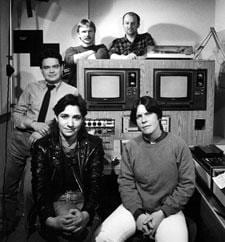This night of programming is a perfect example of why documenting our queer history is not only important but entertaining to watch.
From 1980–1986, the green-but-keen producers of Gayblevision created a public TV show focusing on queers and queer hangouts in and around Vancouver.
“I was the only person out of the 26 volunteers that had any background in media,” recalls former co-producer Mary Anne McEwen. “Everybody was enthusiastic but nobody had ever done anything!”
The two episodes pulled from the vault recapture everything from the beginnings of Hamburger Mary’s to one of the last interviews with legendary writer Tennessee Williams (A Streetcar Named Desire).
On a superficial level, the haircuts, fashion and language of the time are fun to watch, while the serious content documents everything from fondness to struggle.
“This was pre-AIDS when the show started,” recalls McEwen. “The media was doing negative stuff on gay people, and we just wanted more positive stuff!
“Those were the times,” she laughs. “Homosexuality was finally legal, which it wasn’t when I came out. When I came out, it was against the law, and you were considered mentally ill. People go, ‘Oh, come on, that can’t be true!’ But that was the way it was.”

 Why you can trust Xtra
Why you can trust Xtra


